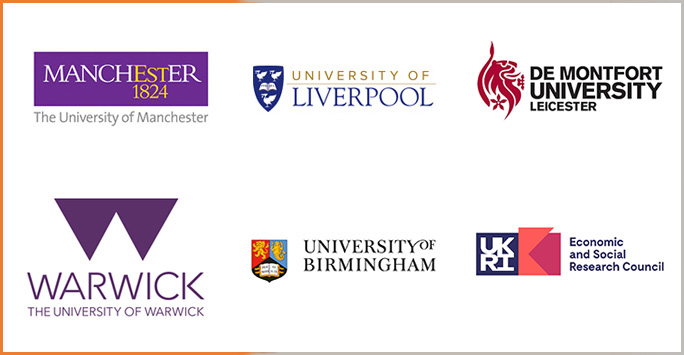The ConnecteDNA project is a collaboration between researchers at the University of Manchester, the University of Liverpool, De Montfort University, the University of Warwick and the University of Birmingham. The project was awarded funding by the UKRI Economic and Social Research Council in order to explore how people involved in donor conception use, and are impacted by, the rise in online DNA testing (sometimes called direct-to-consumer genetic testing or DTCGT for short).
This interdisciplinary project, with Dr Lucy Frith, University of Manchester as Principal Investigator, and Professor Marie Fox, University of Liverpool; Professor Nicky Hudson, De Montfort University; Dr Petra Nordqvist, University of Manchester; Dr Fiona MacCallum, University of Warwick; Dr Jackson Kirkman-Brown, University of Birmingham; Dr Caroline Redhead, University of Manchester; and Dr Leah Gilman, University of Manchester, as Co-Investigators, brings together a team of researchers whose complementary expertise aims to capture aspects associated with donor conception in the age of direct-to-consumer genetic testing. The study will run from March 2021 - February 2024.
What is direct-to-consumer genetic testing?
A growing number of companies now offer genetic testing directly to consumers via websites. The tests usually cost between £50 and £100 and are often marketed as gifts for friends or family who might want to find out more about their family history or ethnicity or sometimes as a health-management tool. Most also offer a linking service which enables people to identify and contact other users who share genetic ancestry.
Some of the most popular websites in the UK include 23andme, Ancestry, myheritageDNA and findmypast but there are many more. The numbers of people who have used DTCGT has increased exponentially in recent years. It is predicted that the total number of people across the world who have taken these genetic tests will exceed 100 million in 2021 (Regaldo 2019).
How is this connected to donor conception?
Online DNA testing creates new ways in which information about genetic connections can be stored and shared. We are interested in finding out how people involved in donor conception use, and are impacted by, this rapidly growing technology. ‘Donor conception’ refers to situations in which sperm, egg or embryos from someone other than an intended co-parent are used by another person(s) with the aim of conceiving a child. Specifically, we will investigate how egg, sperm and embryo donors, parents through donor conception and donor-conceived people experience online DNA testing. The growing availability of this technology enables people to search for (or sometimes unintentionally discover) people linked through donor conception outside of, or in conjunction with, ‘official’ channels (in the UK, this would be the Donor Conceived Registry, managed by the Human Fertilisation and Embryology Authority). However, we know very little about people’s experiences of such discoveries or searches. Our research will address this gap in knowledge.
The rise of online DNA testing also raises questions about the laws and regulations which govern how people access information about genetic relatives. In many countries, donor-conceived people are able to access information about their donor or other ‘donor relatives’ through ‘official’ channels and organisations and there are rules and procedures regarding when and how this is done. Our research will investigate the laws and information management systems in four jurisdictions (UK, The Netherlands, Victoria, Australia and Sweden) and examine how these ‘official’ systems sit alongside or interact with the use of DTCGT to access information about donor conception.

Back to: Liverpool Law School
